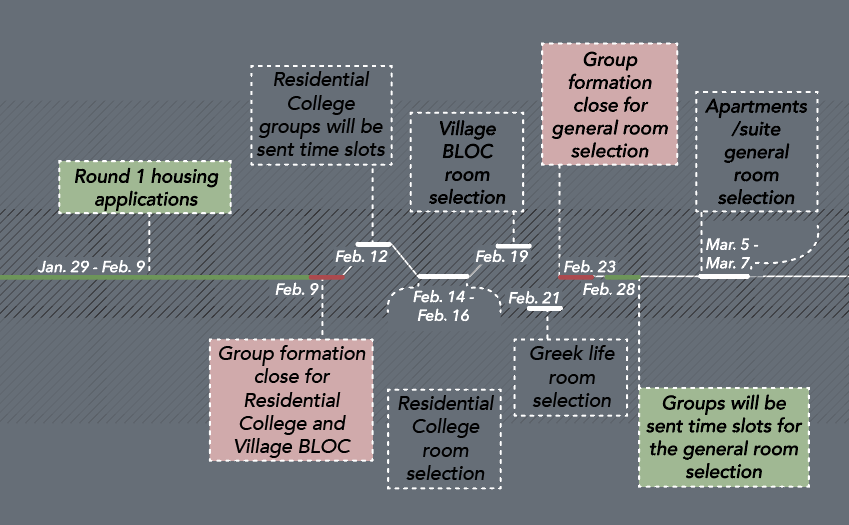News | Residential Life
Residential Life implements new housing application process that will open Jan. 29
Residential Life changed the housing application and room selection process from a lottery-based system to a time slot system for the upcoming 2018-2019 application, which opens Jan. 29.
About 77 percent of Washington University students live on campus or in University-owned housing, and altering the application process will change the way that a majority of students plan their housing accommodations for the following semesters.
 Graphic by Brandon Wilburn
Graphic by Brandon Wilburn Due to an influx of student feedback about the complexity and stress of the lottery system—and the growing infrastructural needs of the University—ResLife has changed to an entirely online time slot system to improve efficiency.
In past years, each student was assigned a lottery number. Groups’ numbers were averaged to determine where each one fell in the general lottery. Under the new system, each group as a whole will receive a randomly assigned time slot.
Similar to previous years, groups of students who wish to stay in their Residential College will enter a Residential College-specific round first. However, if they do not get a room assignment, they will then move on to the general round. Students who opt out of the Residential College round will directly enter the general round.
According to Associate Director of Residential Life and Director of Housing Operations Will Andrews, the change makes the process more fair and transparent.
“Based on student feedback, we looked at peer institutions to find a better system that would work for a university of our size,” Andrews said.
Students who disliked the old housing selection process think that assigning time slots will be more straightforward and less stressful because it eliminates the need to find potential roommates with high numbers to choose a preferred building.
“Everyone’s in a group, so instead of it being so individual and having to band together, you band together and then get [your assignment]. It’s more confusing when you have to average the numbers out,” sophomore Lily Greenwald said.
“Now, I feel like you can just go confidently with the people that you really want to room with, rather than finding people with good numbers,” sophomore Isabelle Perla said.
The time slot system will also be hosted on a new housing portal and take place entirely online, removing the former need to meet with a Residential College director to select specific rooms.
“We got a lot of complaints about [the lottery] because it was really confusing. In the old system, for the Residential College round, everyone would have to physically line up downstairs to choose a room,” senior and Dardick House Residential Adviser Alfred Guo said.
Both the administration and some students seem eager to move past the lottery system; ResLife held six information sessions on the South 40 and two in other ResLife housing areas to spread the word about how the new system will function. Although the time slot system is familiar from course registration, it also involves a significant amount of individual responsibility, especially as one person is responsible for the application of their entire group.
“I definitely think it’s an improvement because it allows you to choose based on who you want to room with. rather than having to think about what their lottery number is and taking that into account when you decide your roommates. I think this new system gives a lot of freedom for students to really decide who they want to live with next year,” Guo said.
Other students are more doubtful.
“The new housing process is incredibly frustrating, since along with figuring out who we’re living with, we have to worry about if we’ll get a good registration time or if we’ll be kicked to off-campus housing,” sophomore Courtney Chan said. “The process is confusing—and I have no idea how preferences and second and third choice options work.”
